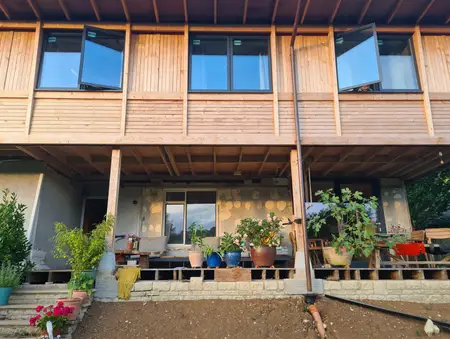People often ask, “Is self-building cheaper than buying?” It sounds like a price question, but it isn’t. Buying a house is shopping; self-building is making. Shopping is about picking. Making is about becoming. If you mix those up, you’ll get the wrong answer.
There are three currencies in housing: money, time and attention. Buying mostly costs money. Self-building spends all three. That’s why simple price comparisons don’t hold. You can move costs between columns. Pour in time and attention - learning, deciding, coordinating - and you can spend less money. Prefer to keep your time and attention? You’ll pay others to spend theirs.
So why can self-build be cheaper? Because a developer’s margin is real, and you can choose not to pay it. Because you can optimise for your constraints instead of the median buyer’s. Because you can trade finish level for square metres, or pick details that are inexpensive but thoughtful. Because you can do some work yourself - not free, but often cheaper if you value the learning and the satisfaction.
But the same list can bite. Mistakes are expensive. Changing your mind mid-build is very expensive. Delays bring interest costs and rent overlap. The supply chain doesn’t care about your schedule. The ground can surprise you. The last 10% of finish can take 50% of the effort. Professionals aren’t pricey because of a conspiracy; they’re pricey because absorbing chaos has value.
A better way to frame it isn’t “self-build vs buying,” but “retail premium vs management tax.” When you buy, you pay the retail premium and hand off management. When you build, you avoid the premium and take on the tax. If you’re good at paying that tax—decisive, curious, comfortable with spreadsheets and a bit of mud - you can come out ahead. If you’re not, the tax compounds.
People also confuse cost with value. The cheapest house you can buy quickly is rarely the one you’ll want to live in for ten years. The cheapest house you can build might be small, calm and perfect for you - or it might become an unfinished project that eats your weekends. A better question than “Is it cheaper?” is “What am I actually trying to buy?” Space? Location? A project? A story?
Self-build also offers a dividend money can’t buy: agency. You can put windows where the light wants them, not where a developer’s plan allowed. You can choose quiet over gloss. You can pick materials that wear in, not out. These don’t show up on an estate agent’s sheet, but they show up every morning when you wake in a place that fits you like a tailored jacket.
Agency isn’t free, though. It comes with responsibility. You’ll make decisions you didn’t know existed - drain falls, insulation tapes, door swings. You’ll find “simple” is the most expensive word in construction. You’ll learn that every drawing is a stack of bets. And you’ll meet your own appetite for reality - exhilarating and exhausting, often in the same afternoon.
If you’re deciding, a few heuristics help:
- Do it for fit, not arbitrage. If saving money is the only goal, you’ll under-scope design and over-scope DIY. That’s how projects drag. Aim for “right size, right bones, right light,” and treat any saving as a bonus.
- Count all three currencies. Ask, “How many evenings and weekends is this?” If the answer scares you and excites you, good sign. If it just scares you, buy.
- Cap your surface area for pain. Complexity is the enemy. Fewer junctions, fewer materials, fewer bespoke details. Simplicity isn’t minimalism; it’s viscosity control for decisions.
- Price indecision. Every change after foundations is a tax. Draw more, mock up more, decide earlier. Your month-ten self will thank you.
- Small is the universal hedge. Square metres are the most expensive thing you’ll ever buy. The best “cost saving” is a smaller, better plan.
- Choose your hard. Buying is emotionally simple and financially blunt. Building is financially surgical and emotionally complicated. There’s no path without pain—only a choice of type.
Will self-build be cheaper for you? If you like learning just enough about everything to make good bets; if you’re stubborn on quality and flexible on route; if you enjoy pointing at a detail and knowing why it’s like that - then yes, it can be cheaper in money and richer in value.
If coordinating trades makes you tired, if ambiguity spikes your stress, if you want a house to be a solved problem when you turn the key, buying isn’t defeat. It’s paying professionals to absorb complexity so you can spend your time on other things you care about. That’s a good trade if you make it on purpose.
The quiet truth is that self-build’s best ROI isn’t in a spreadsheet. It’s the compounding of small right decisions - where the morning sun lands on the table, how footsteps sound on the stair, a window that frames the oak you kept. Those dividends arrive slowly and keep arriving. If that matters to you, the challenge is part of the reward. If it doesn’t, the challenge is just cost.
So: cheaper than buying? Sometimes. Different from buying? Always. If you want a project that turns money, time and attention into a place that fits you unusually well, self-build is the right game. If you want a good house and your life left over, buying is the right game. The mistake is thinking they’re the same game and trying to keep score with a single number.

